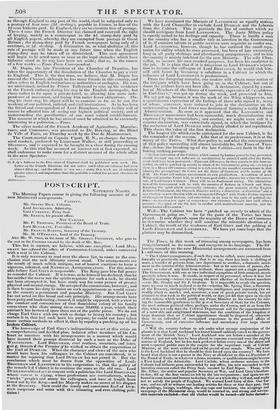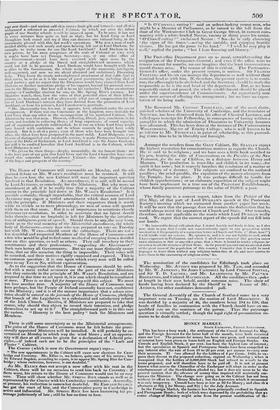The Times, in this week of trimming among newspapers, has
been straightforward in its course, and energetic in its language. The fol lowing remarks on the new Ministerial arrangements are extracted from s columns of this morning.
"'fine Cabinet arrangements, if such they can be called, were yesterday either formally or practically completed ; that is to say, there has been a shifting of seats, a transfer of persons from one department to another, a domestic move- ment in the hiterior of the Administration : but as for accession of power, dm- racter, or value of any kind from without, there appears not a single particle. The Government, with one or two individual exceptions of little moment, stands precisely where it was. It stands, in respect of its personnel, where it was last Monday morning—minus two among the most effective of its former members —viz. Mr. Stanley and Sir J. Graham. It is impossible to evade the question, were we ever so much inclined so to do—whether Mr. Spring Rice, a Secretary of the Treasury, distinguished by diligence, intelligence, and ingenuity (for we readily admit so much), and, moreover, a man of great private wroth, has yet attained to that rank in the political world, or does yet fill that space in thecyes of the nation, which would justify any Prime Minister to his country for rais- ing the honourable gentlemau to the p. st of Secretary of State for the Colonies, the most arduous political office, perhaps, under the Crown, and at an hour like this, when not only does the Colonial Department call for the superintendence of a most aide and enlightened statesman, but the condition of the kingdom at lamp demands that BO Cabinet appointment should be disposed of, otherwise than to an individual of recognized experience in the general affairs of Government, and of extensive influence and ascendancy over large classes of men.
a, Will the country foi hear to ask under what strange conjunction of the planets is it that Lord Auckland has found himself suddenly raised to the govern- ment of the British Navy ? Lord Auckland was not before a member of the Cabinet ; and not only has he been placed in supreme command over the mighty marine of England, but he has been preferred before every one of the ablest and most respected public men in the empire for the important rank of Cabinet: Ministei, at the most critical and awful period of our annals. Who and what is the Lind Auckland that he should be thus forced upon the country? We have heard that there is not a purser in the Navy at all inferior to this ex-President ot the Board of Trade, in whatever talents, manners, or qualifications inight become a First Lord of the Admiralty. Lord Carlisle, whose arduous services in the Cabinet bad hitherto gone unrewarded by any office, has now succeeded to that lucrative sinecure called the Privy Seal, vacated by Earl Ripon. These, with Mr. Ellice, the active and popular Secretary at War, and Lord Grey's brother- in-law, fill up the four vacancies left by the late resignations; and again we are bound in conscience and honour to declare, that as a whole they will not, and ought not to satisfy the people of England. We warned Lord Grey of this. Our fear was, and we call to witness our leading articles for thne or four days past, that the paddings, linings, weddings, the stay-tape and buckram, the scrapings and sweepings of the Ministerial shop, would be resorted to, and strong and service- able materials excluded—that old clothes would be turned—old holes darned- rags new dyed—and ancient calf-skin covers fresh gilt and lettered — and all this nicknamed a reformed or amended Cabinet, by which not even the infant pupils of our Sunday schools would be Unposed upon. To be sure, it has not in every instance been quite so bad as that; but let Lord Grey or Lord Brougham look round and try if they can discover one rational being in the community pleased with this last week's operations. Why was a man of such decided ability and such manly and open bearing left out as Lord Durham, for example, to make room fur one like Lord Auckland? Lord Dui ham in his own person, by his mere acceptance of the seals of Colonial or (we wish it might have been so) Foreign Secretary—nay, or any other office of the Government—would have been received with open arms by the country as a pledge of the liberal and straightforward measures which could not fail to be pursued. Lord Durham would have brought with him
allies to the Government, the whole weight of the numerous, intelligent, well-organized, and now we are afraid alienated and embittered, Disseuting bedy. They know the steady and enlightened attachment of that noble Earl to their cause, in so far as it is the cause of good government, including that of equal justice ; and we repeat that the Dissenters would have claimed from Lord Durham no further immediate pledge of his support, beyond his personal acces- sion to the Ministry. But how will it be on his exclusion? There are elections coming—a Cambridge election for one, on Mr. Spring Rice's vacancy. Let 'Ministers watch, then, how the votes of that powerful class of their fellow- citizens are bestowed, and tell us afterwards what sort of compensation for the loss of Lord Durham's interest they have derived from the promotion of Lei d Auckland, or from his patron's, Lord Lansdowne's, gratitude.
" Mr. Abercromby too, has not, it appears, been admitted under the recent arrangement. If there was one Commoner in the kingdom more desirable for Lord Grey than any other in the recomposition of his mutilated Cabinet, 3Ir. Abercromby was that man. Discreet, reflecting, liberal, just, considerate in his views, and resolute in enforcing them ; of long experience, of sound sagacity, and of reputation perfectly unblemished, he is one on whom Lord Grey might have leaued with confidence, and to whose counsels he might have safely listened. But it is all of a piece ; even of those who have been brought into office, the ablest have been postponed to the most stolid. Lord Mulgrave, no- bleman of distinguished and invaluable service, is made Postinaster-General in place of the Duke of Richmond, as Lord Auckland is rice Sir James Graham ; but will it be credited hereafter that Lord Auckland is in the Cabinet, whilst Lord Mulgrave is not?
"We grieve for these things—deeply, mournfully, do we lament them : nor is the least part of our pain that Lord Grey and the Lord Chancellor have sanc- tioned this miserable lath-and-plaster Cabinet—this woful disappointment of the hopes and prospects of the country."





















 Previous page
Previous page